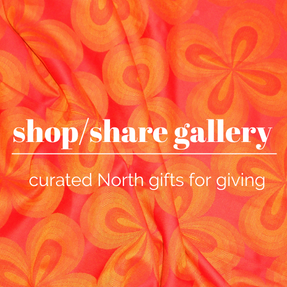That realization shifted Ong’s path. Slowly, the outfits in her feed transitioned from black-and-white to more vibrant colors, while the backdrops changed from hotel rooms in far-flung cities to the grass in her backyard. Her captions got longer and started delving into topics like politics and sustainable laundry practices. By 2020, the transformation was so complete that one might easily have mistaken Ong for an entirely different person from the blogger once known for creating Neon Blush.
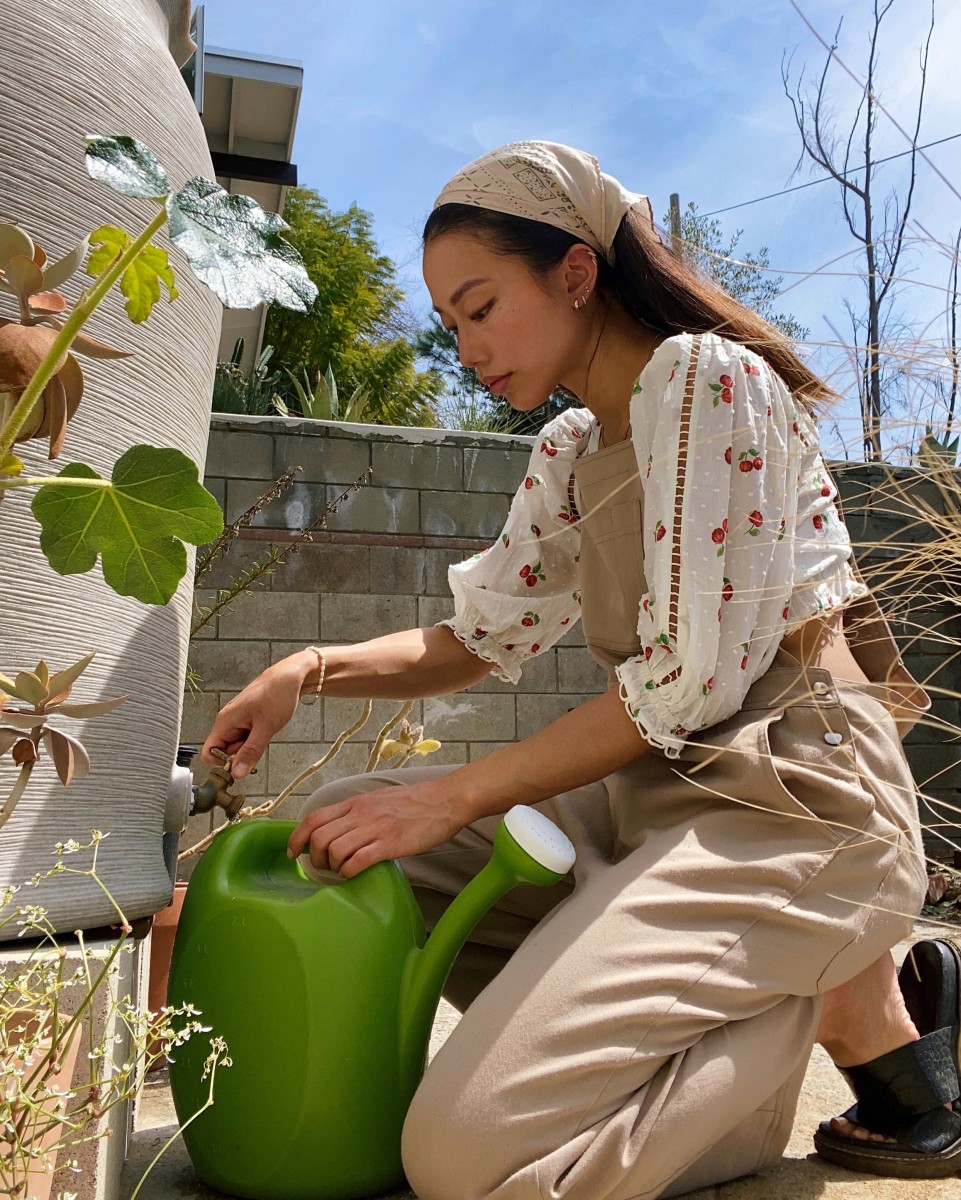
Jenny Ong in her garden. Photo: Courtesy Jenny Ong
Her new goal was “to make conscious, slow living seem as beautiful as, if not more beautiful than, life lived at full speed,” she says. She became a “homestead hobbyist,” sharing pictures of vegetables she’d grown and the antics of her colorful egg-laying chickens. Sponsored outfit pictures still appeared, but they featured a more narrow curation of brands and were often shot against a vegetable garden backdrop.
In some ways, she couldn’t have been better prepared for the coming pandemic — from a content perspective, at least — if she had tried. Half the country seemed to be planting victory gardens or building chicken coops for the first time, and Ong made doing so look magazine-worthy. In a world where travel, runway shows, crowded fashion parties and restaurant dining disappeared overnight, Ong’s depictions of a good life that consisted mostly of spending time outdoors without other people became extra appealing. Soon, that lifestyle was getting co-signed by the likes of Teen Vogue and the New York Times, which ran style pieces celebrating farmers and gardeners as the pandemic stretched on.
Ong’s not the only influencer whose content bridges the worlds of fashion and a life connected to the land. Kristi Reed makes her primary living selling secondhand clothing via her business Windy Peak Vintage, but she knows it’s her charming images of life on a homestead in rural Montana that initially draws people to her page.
“I think a lot of people that follow me fantasize about living rurally,” Reed says. “I try to portray the magic of the country.”
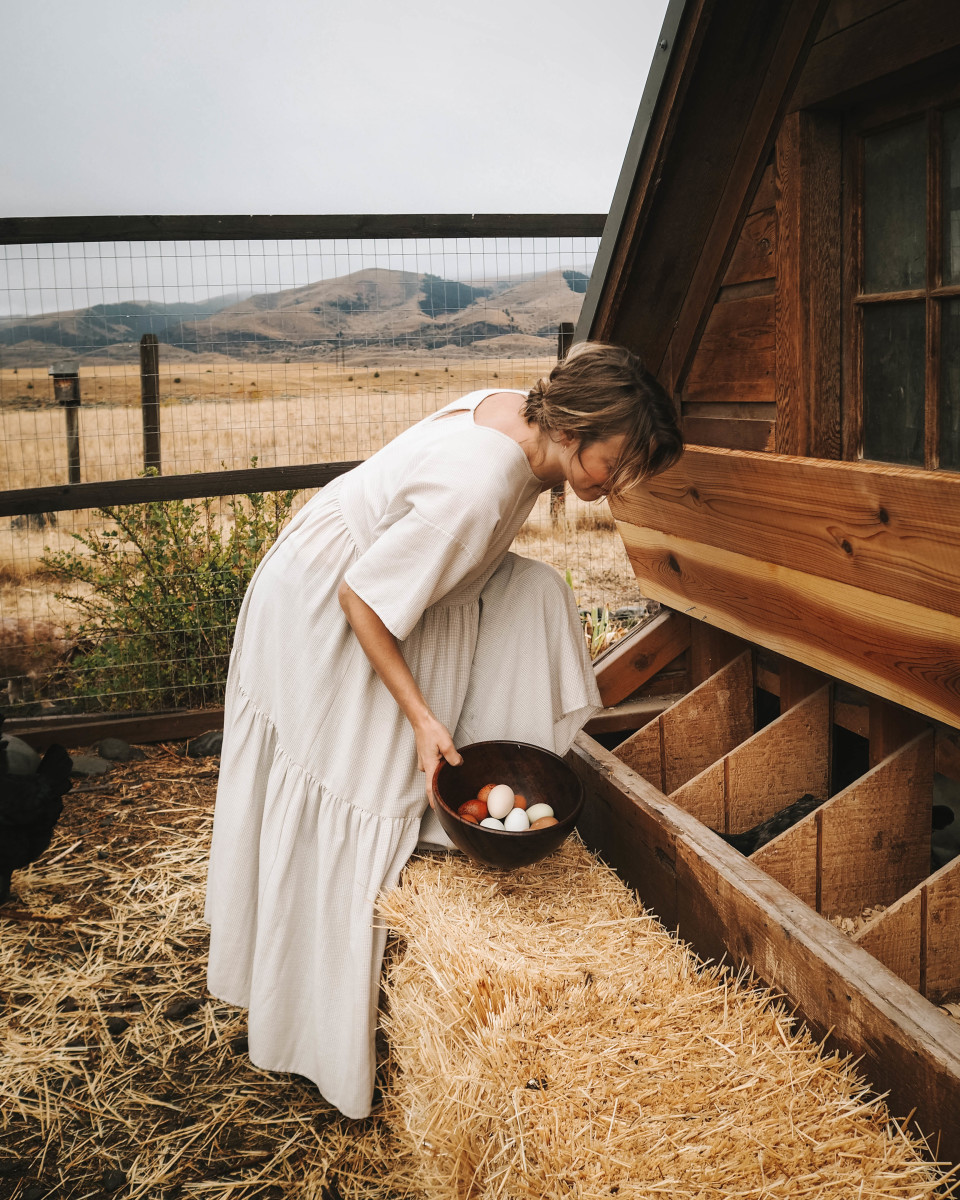
Kristi Reed gathering eggs from her chicken coop. Photo: Courtesy Kristi Reed
Through Reed’s lens, that looks like a yard full of goats, bunnies and chickens; children bathing in wheelbarrows; piles of hand-split firewood and big-sky Montana sunsets. The fact that Reed is always impeccably dressed in her pictures — hanging laundry in a billowy Dôen blouse, gathering eggs from the chicken coop in a flowy Christy Dawn dress — certainly adds to the fantasy of idyllic rural life. Reed admits that she’s not always actually dressed like that while doing chores, but all that means to her is that curation is part of the magic.
“Half the time I wear sweatpants and a baggy shirt when I go feed the chickens and don’t feel too inclined to take photos,” she says. But when she gets dressed up for work and likes her outfit, she makes sure to snap a photo doing whatever needs doing on the homestead, and those are the snippets of her life that followers see.
Reed’s approach is a bit different from that of Indy Srinath. As an urban farmer and educator in LA, Srinath isn’t painting a picture of rural life so much as casting a beautiful vision of what it looks like to forage, garden and grow your own food without moving away from an urban center. Srinath’s feed is certainly aspirational, albeit in a slightly different way: It features her own poetry, gorgeous vegetable flatlays and pictures of her foraging for mushrooms in earth-toned outfits.
Though Srinath’s background is more in farming and foraging than fashion, her well-defined aesthetic has attracted brand partners like Free People and Eddie Bauer. But Srinath insists that the clothing she wears in pictures really does reflect what she looks like as she goes about the business of growing, foraging for and harvesting food.
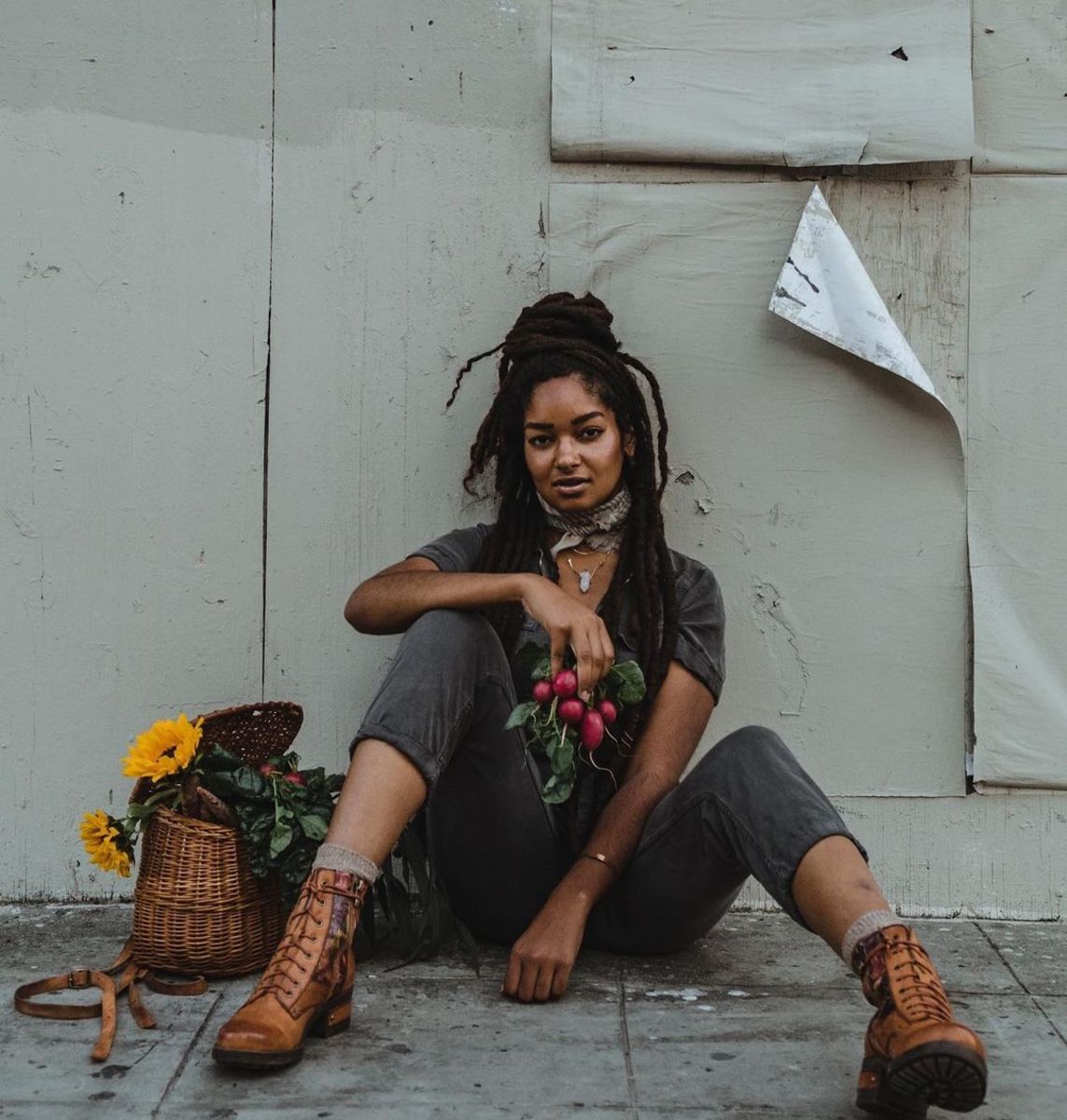
Indy Srinath with some beets. Photo: Courtesy Indy Srinath
“When people volunteer at the urban farm where I work on Skid Row, they comment like, ‘Whoa, you really do dress like this at work,'” she says. “I have to be like, ‘This is me dressing down — it just happens to be matching and accessorized.'”
Regardless of what they wear when no one else is around, Srinath, Ong and Reed are all helping make a certain kind of lifestyle seem aspirational. The visual worlds they inhabit walk a line that feels more fashion-y than outdoor sports-y but is not quite as dainty or purely aesthetics-driven as the cottagecore cohort. They may use their visual brands to sell clothing, but ultimately the backdrop is a lifestyle that can’t be escaped once the camera’s put away. The tomatoes and okra and chickens still need tending even when there’s no sponsored content to be made.
It’s this commitment that can lend an air of authenticity to the posts of all three — no matter how much they present idealized windows into their lives, it’s clear there’s a real lifestyle involved that can’t be totally faked. That’s not to say there’s no difference between them and, say, full-time farmers, most of whom don’t have time to snap pretty pictures of themselves doing the work required to keep such an operation going. It’s just to note that they represent a slightly different category of content creators whose aesthetic can’t simply be purchased and delivered in a well-packaged mailer. On at least some level, it has to be lived.
This sense of authenticity carries through to the way that the three talk about clothing, too. With content so focused on plants, animals and the outdoors, it makes sense that Ong, Reed and Srinath integrate environmental concerns into how they market clothing. For Reed, that means promoting primarily vintage. For Srinath, it’s including plenty of brands that rely on organic cotton or offset their carbon footprints. And Ong broke ranks with her former agency so she could be more choosy about which partnerships she accepted, focusing on brands that use natural or recycled materials.
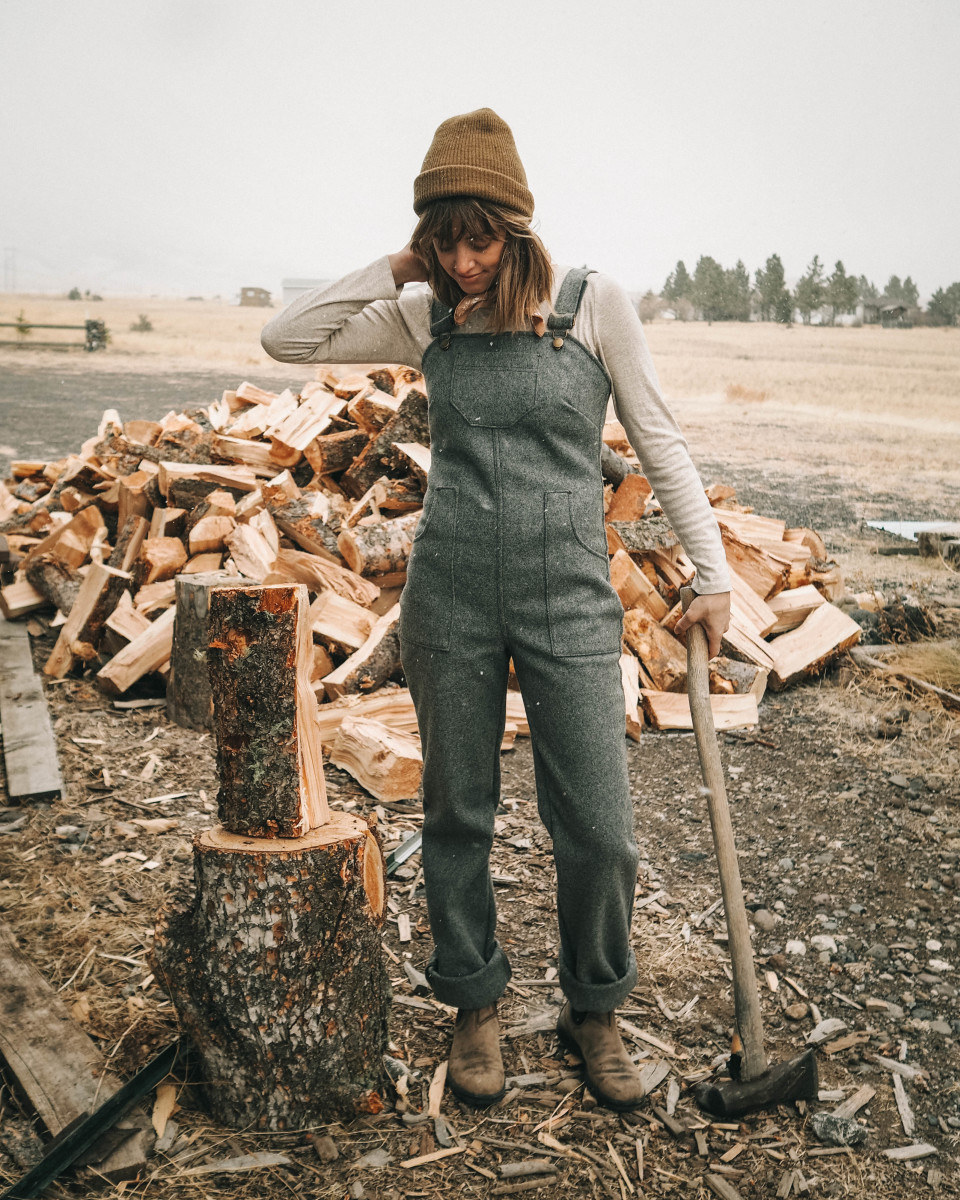
Kristi Reed chopping wood. Photo: Courtesy Kristi Reed
Still, hardcore activists might have bones to pick with any of them: Brands like Uniqlo and Free People being included in their rosters would incite cries of labor abuse and cultural appropriation from some, while others might just question whether it’s even possible to be a “sustainable” fashion influencer if slowing consumption is what the planet needs. But these women would likely counter that their sponsored posts enable them to keep creating free content that educates followers on everything from zero-waste lifestyles to how to engage their state representatives.
Beyond the clothing influencer bit, there are other complications involved with romanticizing living off the land. Indigenous people on the continent settlers named North America sustainably stewarded land right up until it was violently stolen from them, and many still advocate for “putting Indigenous Lands back in Indigenous hands.” And even after the American project began, access to land ownership became a privilege that was systemically and strategically denied to Black people.
As a white woman, Reed’s skin color has played a role in the kind of relationship she has with the land. Living in a rural part of the U.S., Reed felt that tension strongly in the summer of 2020 as the nation faced a reckoning on racial injustice. As protests began to gain momentum around the nation, Reed found herself far from any major cities where she could’ve at least joined in-person demonstrations in solidarity with Black Lives Matter. But she says using her platform to connect in some way to the movement felt useful.
“A lot of my followers are white farmers, so I feel like it’s good to push boundaries with people,” she says. “And it feels good to be able to have a little bit of a voice and to show that not all of rural America is Trump supporters.”
Ong’s means for engaging with the political turmoil in the country has involved researching and writing lengthy posts that pair her sunny imagery with information on voting, text banking and climate action. Early on, this attracted “stay in your lane” comments from followers who were expecting nothing but fashion and beauty content. But these days, Ong says most of those people have unfollowed her, so she doesn’t get much pushback anymore.
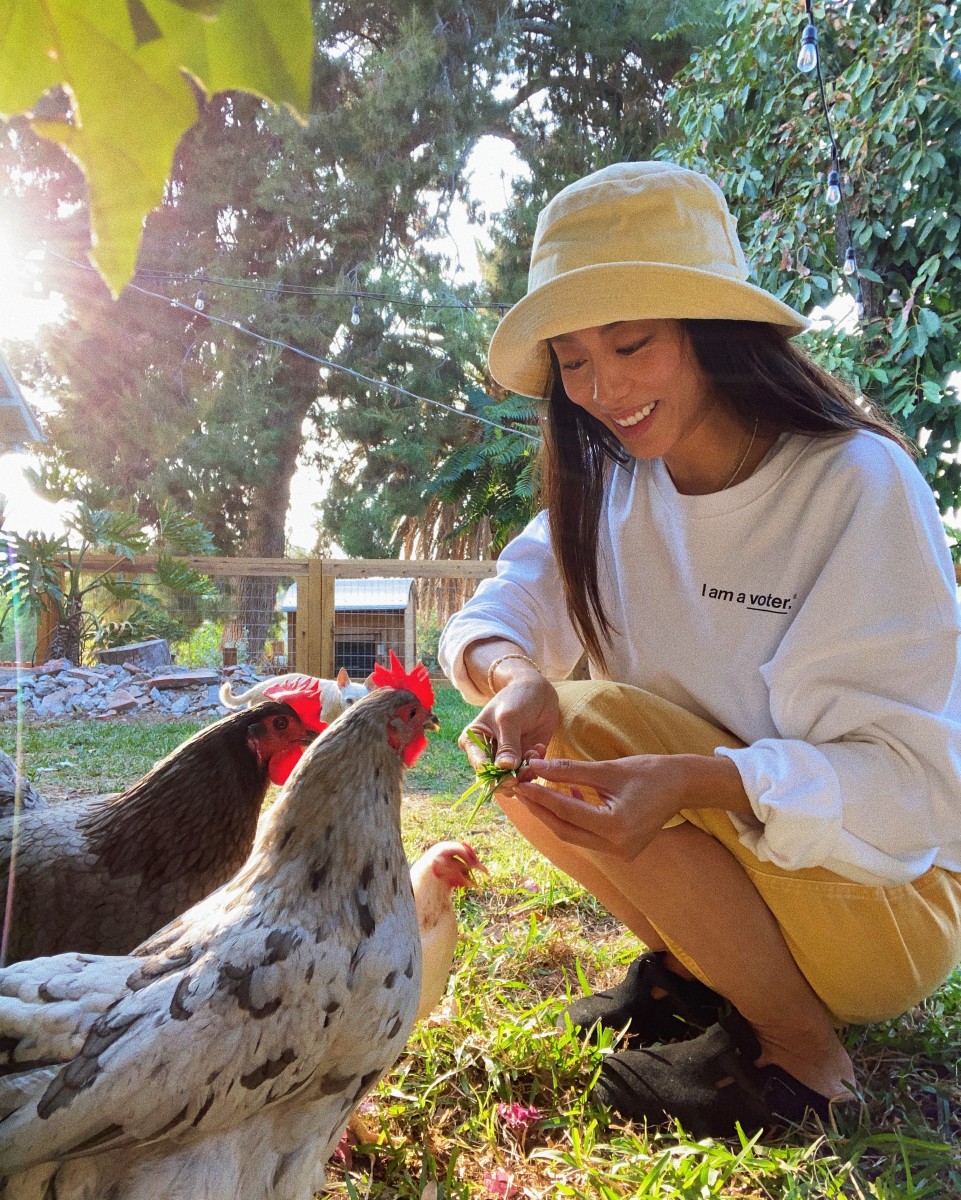
Jenny Ong feeding her chickens (and making a statement about voting). Photo: Courtesy Jenny Ong
Srinath also talks explicitly about politics, racism and land access issues in her posts. But in many ways she sees her presence in agricultural and outdoor spaces as powerful in and of itself.
Growing up in North Carolina and being involved in clubs like Future Farmers of America, Srinath experienced firsthand the ways that agricultural spaces can conspire to make Black people feel unwelcome or unsafe, whether that’s simply because everyone else in the room is white or because of more overtly racist symbols like the Confederate flag being flown. Her goal is to counteract some of that through her online and in-person presence.
“I want to be a refuge where people can go and realize that Black lives do matter, Black joy matters, our passions matter and we aren’t always doing the emotional labor of educating on injustice,” she says. “We’re also living our lives, growing food, making pickles and exploring nature.”
Srinath has also begun fundraising for a Black-owned, Black-led community farm in LA so she can extend that influence beyond the world of social media. Having invested “sweat equity” into numerous white-owned farms, she dreams of a day where she works the soil of land that can’t be taken away from her.
“I really want folks to know that growing your own food is accessible. Being a person of color in outdoor spaces is hard but it’s doable,” she says. “And there’s always a need for more organic produce in Black and Brown communities.”
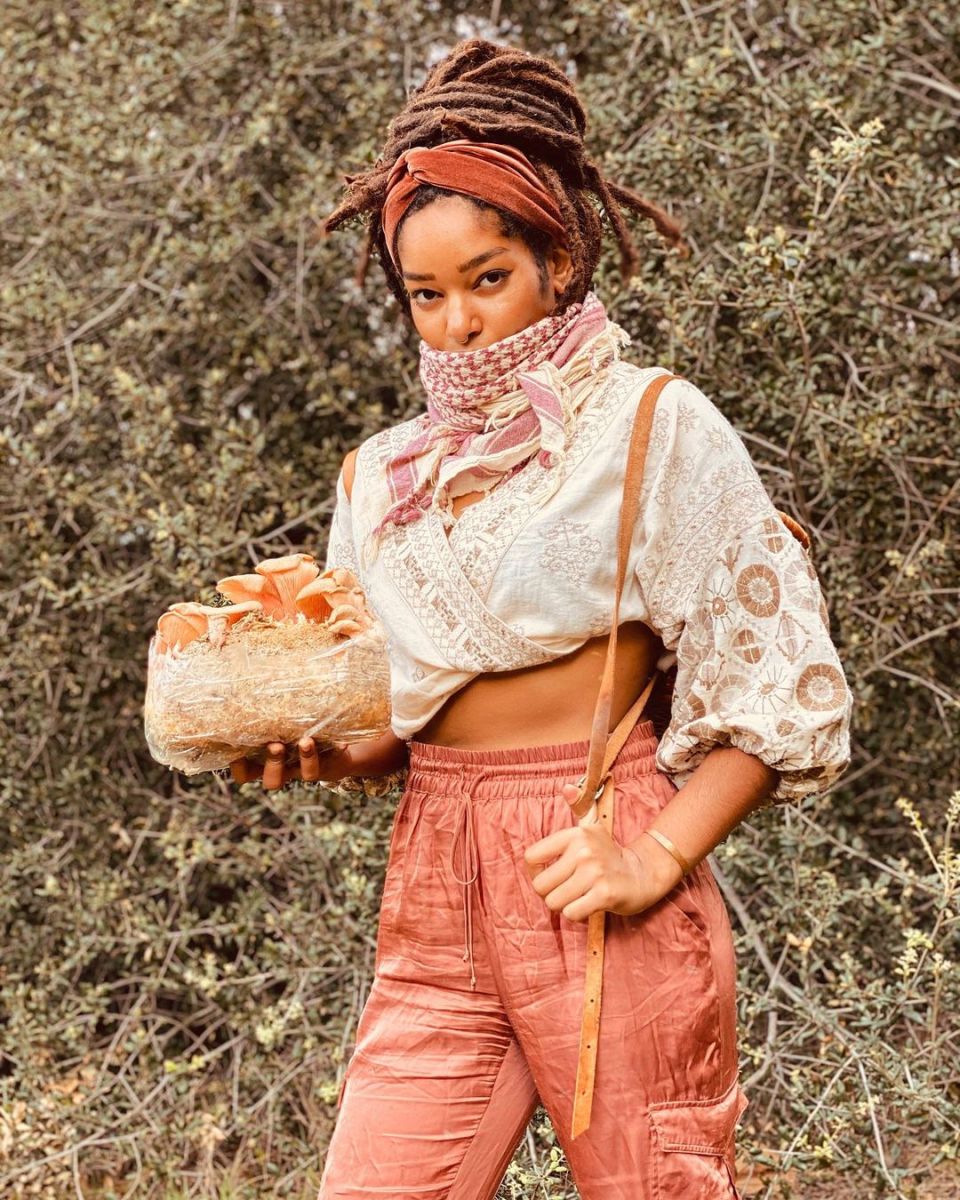
Indy Srinath with mushrooms. Photo: Courtesy Indy Srinath
Until she reaches her funding goal, she’s going to continue relying on content creation for at least part of her income.
With vaccine rollout promising that there’s an end in sight for the pandemic — even if it’s still further off than anyone would like — it’s unclear whether the appeal of the farmer/forager lifestyle will start to decline. Will urbanites still fantasize about leaving the city behind to live off the land once their favorite bars, restaurants and performance venues open up again?
If there’s anything the pandemic has made clear, it’s that trying to predict the future is futile. But many are hopeful that Covid-19 has forced the world to slow down in a way that might have positive, lasting implications even once vaccines are widely distributed. If that’s so, growing one’s own food and forging purposeful connections with the land may be here to stay in our collective aspirations.
“At my core I believe as human beings we all inherently have that connection to nature and growth,” says Ong. “We just need to trust our intuition on how to best steer it.”




